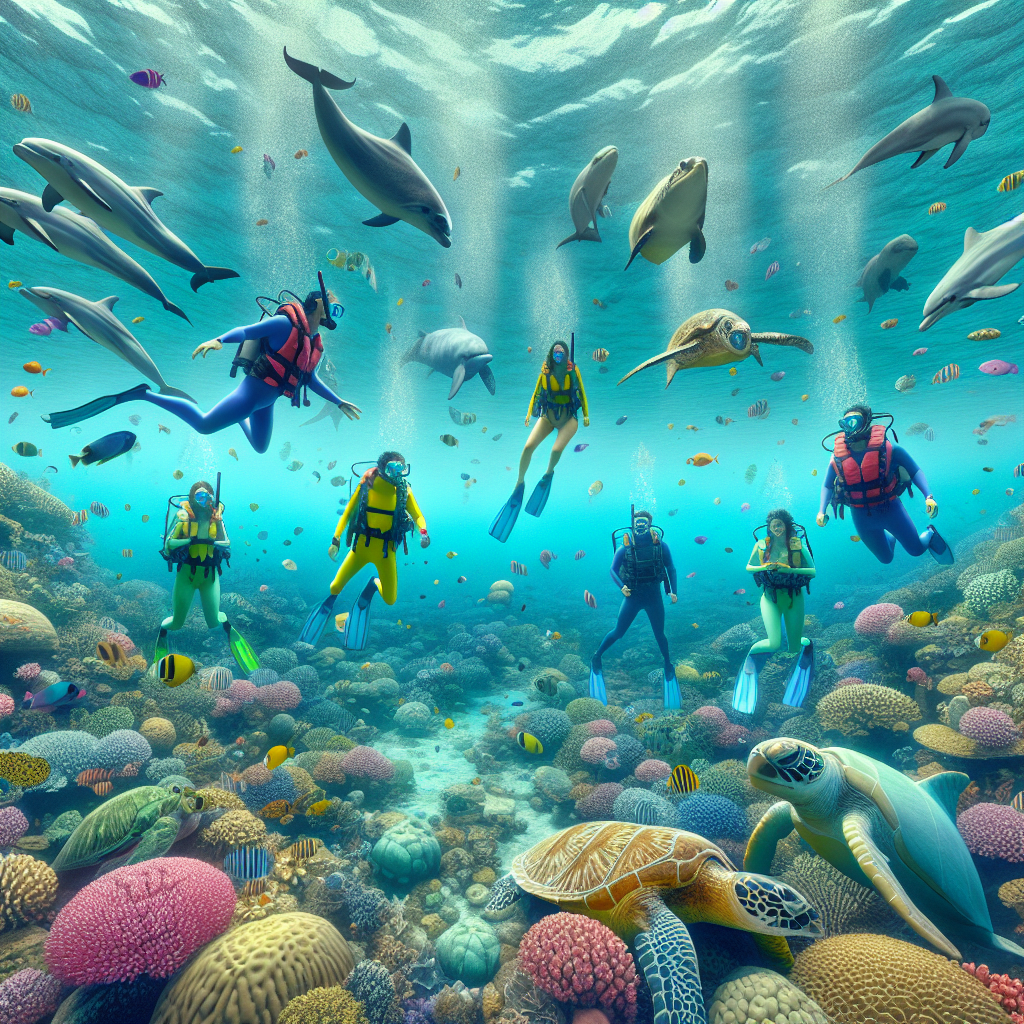Ethical Guidelines for Engaging with Marine Life in Tulum
Tulum, located on the Caribbean coast of Mexico’s Yucatán Peninsula, is renowned for its stunning marine ecosystem and offers an unparalleled opportunity to engage with diverse marine life. However, protecting these natural resources is critical for preserving the delicate balance of this environment. This guide presents ethical guidelines for engaging with marine life in Tulum.
1. Understand Local Marine Biodiversity
Before engaging with marine life, familiarize yourself with the local species. Tulum’s waters are home to a variety of species, including the green sea turtle, snorkeling-friendly fish, and vibrant coral reefs. Recognize the importance of each creature, from apex predators to tiny plankton, in maintaining the ecosystem’s health. Learn about their behaviors, habitats, and breeding cycles to enhance your appreciation and ensure responsible interactions.
2. Choose Sustainable Tours and Operators
Select tour operators who adhere to sustainable practices. Look for companies certified by organizations that prioritize ecosystem conservation. These operators typically implement best practices, including minimizing environmental impact, promoting conservation, and educating guests on marine biology. Reviews and testimonials can help gauge their commitment to responsible tourism.
3. Respect Distances and Avoid Touching Marine Life
Maintaining a respectful distance from marine life is crucial. Many creatures, particularly turtles and rays, are vulnerable to stress caused by close encounters. To minimize disturbance, always observe marine life from a safe distance, ensuring that their natural behaviors are not disrupted. Never attempt to touch, feed, or provoke marine animals, as this can lead to harmful consequences for both wildlife and visitors.
4. Limit Use of Sunscreen and Other Chemicals
Sunscreens containing harmful chemicals, such as oxybenzone and octinoxate, can damage coral reefs and marine life. Opt for reef-safe sunscreens labeled as biodegradable or containing mineral-based ingredients like zinc oxide or titanium dioxide. Additionally, wash off any products before entering the water and avoid using items that can introduce pollutants into Tulum’s fragile marine environment.
5. Participate in Clean-Up Activities
Engaging in local beach and ocean clean-up initiatives helps preserve the beauty and health of Tulum’s marine ecosystems. Join community efforts organized by local NGOs or businesses, or organize your own group. Not only does this reduce pollution, but it also raises awareness about the impact of waste on marine life. Every piece of trash removed contributes to a cleaner, safer environment for marine organisms.
6. Educate Yourself on Local Conservation Efforts
Understand and support local conservation programs. Agencies like the Comisión Nacional de Áreas Naturales Protegidas focus on protecting marine life and their habitats. By learning about these endeavors, you can become an advocate for their initiatives, whether it’s through volunteering, donating, or spreading the word regarding the importance of marine conservation.
7. Avoid Disturbing Habitats
When snorkeling or swimming, take care not to disturb sensitive habitats, including coral reefs and seagrass beds. Swim above these ecosystems rather than through them, and encourage fellow explorers to do the same. Walking on coral can cause irreversible damage, harming the delicate structures that serve as homes for countless marine organisms.
8. Engage in Responsible Photography
Photography can be a wonderful way to capture and share marine experiences, but it should be done mindfully to avoid disturbing marine life. Use zoom lenses to photograph wildlife from a distance, preventing any potential stress or disruption to their natural behavior. Refrain from using flashes underwater, as this can startle marine animals and disrupt their activities.
9. Abide by Local Wildlife Regulations
Familiarize yourself with local regulations regarding wildlife interactions. Many areas have specific rules designed to protect sensitive species and habitats. Regulations, such as no-touch policies in marine parks or limited access to certain areas during breeding seasons, should be respected to ensure the safety and preservation of marine life.
10. Practice Marine-Based Etiquette
Crews and fellow participants will appreciate courteous behavior. When engaging on boats or during group excursions, listen to your guides’ instructions and show respect for the marine environment. This not only fosters a positive atmosphere but also reinforces the significance of ethical engagement with the sea.
11. Support Eco-friendly Accommodations
Choose eco-conscious lodging options that implement sustainable practices, such as waste reduction, energy efficiency, and eco-friendly materials. Accommodations focused on environmental preservation can often provide insights into the local ecosystem and support efforts that protect marine habitats.
12. Be Aware of Charter Fishing Regulations
If you’re interested in fishing, ensure adherence to local fishing regulations and sustainable practices. Tulum is home to excellent fishing spots, but overfishing can threaten local populations. Opt for catch-and-release methods whenever possible, and seek guidance on local best practices concerning species limits and seasons.
13. Leave No Trace
Commit to the principle of “Leave No Trace.” This means taking back everything you bring to the beach or ocean, including garbage, leftover food, and any additional items. Leave natural settings exactly as you found them to contribute to the overall well-being of Tulum’s marine ecosystems.
14. Engage in Citizen Science
Participate in citizen science initiatives designed to monitor and protect marine life. Several groups and research projects encourage travelers and locals to contribute data on species sightings and environmental changes, helping scientists make informed conservation decisions.
15. Respect Indigenous Communities
Engage with local indigenous communities respectfully. Many indigenous groups possess traditional knowledge about marine ecosystems that can greatly enhance your experience. Support local artisans and consider learning about their conservation efforts and perspectives towards marine life protection.
16. Stay Informed on Climate Change
Understand the impact of climate change on marine ecosystems. Rising ocean temperatures, ocean acidification, and altered weather patterns contribute to challenges for Tulum’s marine life. By staying informed, you can be an advocate for sustainability and take informed actions in your daily life that promote environmental health.
17. Advocate Responsible Tourism Practices
As a visitor, you can advocate for responsible tourism practices in Tulum. Share your experiences and the principles of ethical engagement with friends and family or on social media platforms, amplifying the message of conservation. The more people are aware of the need to protect marine life, the stronger the movement toward sustainability will become.
18. Understand the Role of Marine Protected Areas
Familiarize yourself with marine protected areas (MPAs) in Tulum. These regions are designated to conserve marine biodiversity and habitats, preventing destructive activities. By understanding the limits and rules of MPAs, you contribute to their success and the preservation of marine life.
19. Learn About Marine Ecosystem Services
Educate yourself on the ecosystem services provided by marine environments, such as nutrient cycling, carbon sequestration, and habitat provision. Recognizing the value of these services can foster a deeper respect for marine ecosystems and inspire sustainable behaviors.
20. Promote Safe and Responsible Wildlife Tours
Once you’re knowledgeable about ethical wildlife engagement, promote safe and responsible wildlife tours to others in your journey. It is vital to guide fellow adventurers toward practices that respect wildlife and contribute to the conservation of precious marine assets, ensuring that future generations can enjoy Tulum’s remarkable underwater world.







